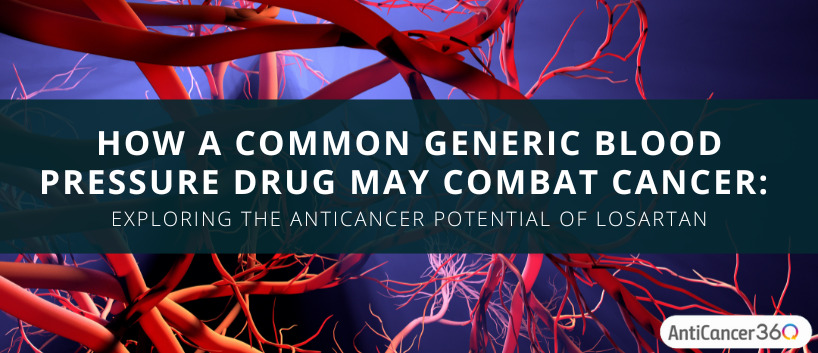During cancer treatment, some people choose to use natural remedies and lifestyle changes alongside recommended oncology treatments. An additional popular approach is using medications off-label, which means using them for a purpose not approved by the FDA but supported by evidence of potential benefits.
Losartan is a prescription blood pressure medication being studied for its potential anticancer effects. Keep reading to learn more about losartan, how it works, and possible benefits when fighting cancer.
What is Losartan?
Losartan (brand name: Cozaar), is a common oral medication that nearly every retail pharmacy carries. Since its FDA approval in 1995, losartan is most commonly used to treat high blood pressure in adults. It can also be used in children (age 6+) with high blood pressure [1]. Losartan belongs to the class of medications known as angiotensin II receptor blockers (ARBs). The American Heart Association’s Guidelines for Hypertension treatment name ARBs as the preferred first-line therapy for the treatment of high blood pressure, making this a popular drug [2]. ARBs block the angiotensin II receptor as a part of the renin-angiotensin system (RAS).

When in excess, angiotensin II is a protein that can cause constriction of blood vessels and fluid retention in the body, leading to elevated blood pressure. In addition to its effect on the circulatory system, excessive angiotensin II can cause endocrine, nervous system, and urinary complications [3]. It is thought that angiotensin II may drive tumor growth [4]. Losartan works by blocking angiotensin II from binding to its receptors.
Recent literature on the renin-angiotensin system suggests that at the local tissue level, RAS may influence tumor growth and metastases. Recent experimental studies provide strong evidence that drugs that inhibit the RAS can potentially reduce cancer risk or slow tumor growth and metastases. Using losartan for manipulation of the RAS may, therefore, provide a safe and inexpensive anticancer strategy [5].
Keep in mind that losartan is not proven to treat or prevent cancer and is not FDA-approved for this purpose [6].
Potential Anticancer Effects of Losartan
Losartan has multiple anticancer actions, with evidence that the drug may have a role in colorectal, breast, ovarian, liver, lung, nasopharyngeal, and pancreatic cancers. Losartan is also thought to reduce the appearance of kidney and heart fibrosis [7].

Losartan’s potential mechanism against cancer is believed to consist of four major pathways [8]:
- RAS pathway
- Inhibiting collagen deposition and maturation
- Decreasing microvessel tumor density
- Improving the delivery of therapeutic nanoparticles via inhibition of collagen synthesis
Let’s look at each of these mechanisms in more detail.
Anticancer Mechanism #1: RAS Pathway
Losartan works by blocking angiotensin II from reaching its receptor in blood vessel muscles. This is thought to disrupt the balance between oxidants and antioxidants in cells, promoting molecules that attack and kill cancer cells. Studies suggest that the RAS pathway, which losartan affects, may play a role in tumor progression, cell proliferation, blood vessel growth, inflammation, and cell death [9].
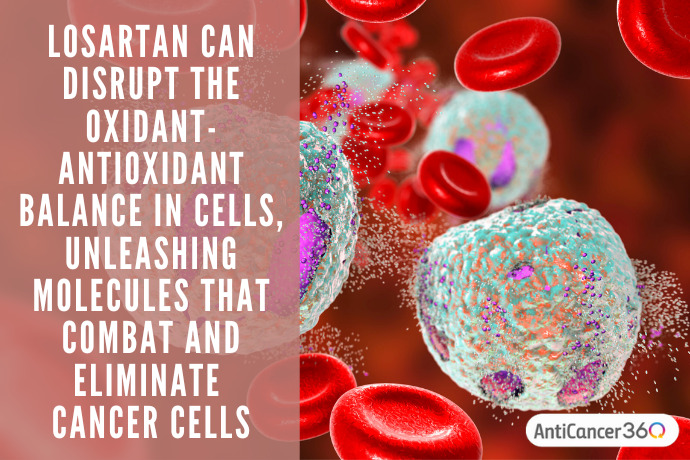
Losartan combats these effects by blocking angiotensin II from reaching its receptor in muscles surrounding blood vessels [10]. Inhibiting RAS with losartan can also change tumor blood flow, starving the tumor and leading to death [11].
Anticancer Mechanism #2: Inhibiting Collagen
Losartan also has anticancer effects by inhibiting collagen deposition and maturation [12]. Type I collagen is a naturally occurring substance in the body that provides the structure of several tissues.
Interactions between tumor cells and collagen can lead to cell proliferation and cell shape abnormalities, leading to cancer development. Type I collagen fragments are also diagnostic markers of metastatic cancers (cancers that have spread to distant areas of the body) [13].
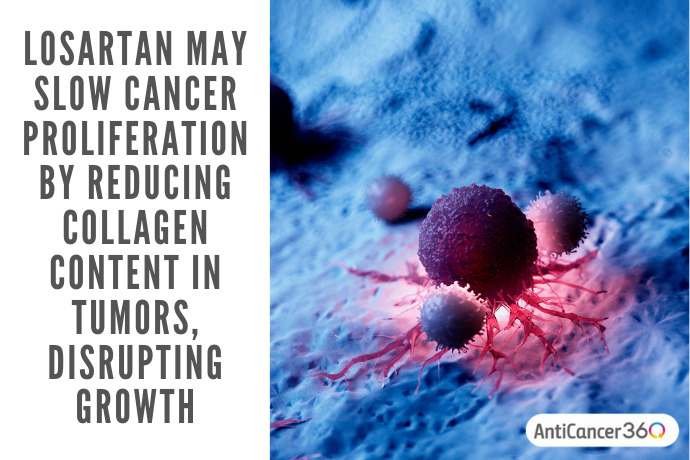
Losartan reduces collagen content in tumors. This disrupts the relationship between collagen and the tumor. As a result, the tumor can’t grow; thus, losartan has the potential to diminish cancer proliferation [14].
Anticancer Mechanism #3: Decreasing Microvessel Tumor Density
Losartan also plays a role in cancer treatment by decreasing microvessel tumor density. Transforming growth factor beta (TGFβ1) is a signaling protein involved in tumor progression and metastasis [15]. Losartan decreases TGFβ1 expression and activation, and so it can slow the growth and spread of tumors as well as vascular complications [16].
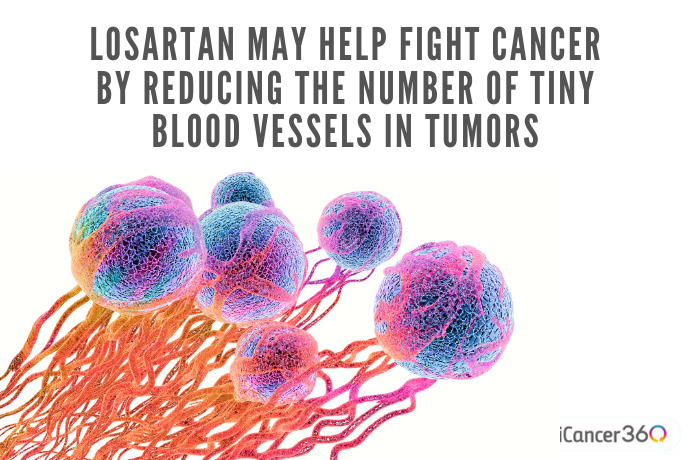
Anticancer Mechanism #4: Improving Nanoparticle Delivery
The final way in which losartan is believed to have anticancer effects is by helping to improve the delivery of therapeutic nanoparticles via inhibition of collagen synthesis [17]. Nanoparticles are an emerging therapy option for cancer treatments. However, they pose a challenge for certain cancers, as nanoparticles often cannot penetrate fibrotic tumors [18].
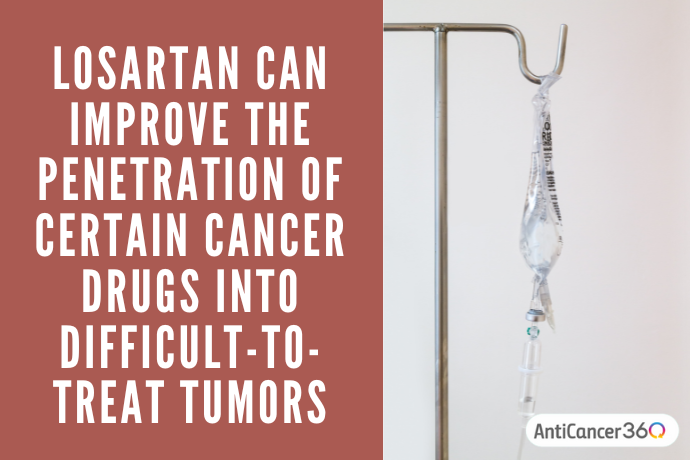
Losartan can enhance the ability of nanoparticles to enter cancer cells by preventing collagen from binding to the tumor. Since collagen helps the tumor grow, losartan can interfere by blocking collagen from occupying tumor entry points, thus allowing the passing of nanoparticles to enter the cancerous cells and elicit its anticancer response [19].
Evidence For Losartan in Multiple Cancers
In this section, we’ll highlight some of the evidence behind the anticancer effects of losartan.
Colorectal cancer
In patients with colorectal cancer, the RAS pathway is upregulated (overactive) and tends not to respond as well to chemotherapy, leading to worse outcomes. A 2021 study assessed how losartan combined with chemotherapy affects colorectal cancer cells. This study found that losartan stopped cell growth and prevented the cancer cell from moving on to its next life cycle stage. In this study, losartan also reduced tumor growth and even caused tumor cell death. Losartan was able to encourage the body’s immune system to fight off cancer cells, diminishing metastases and reducing harmful effects on the body’s blood vessels [20].
Breast cancer
Losartan has also been studied in triple-negative breast cancer, a type of breast cancer that does not respond as easily to chemotherapy as other types. A study administered losartan alongside nano-chemotherapy to assess if this was a viable treatment. The results showed that losartan enhanced the ability of nano-chemotherapy to enter cancer cells and enhance anticancer tumor destruction, also reducing tumor spread [21].
Ovarian cancer
Ovarian cancers often stop responding to chemotherapy. As a result, researchers are investigating other treatment options in the hope of finding a breakthrough. A 2018 study found that the use of ACE inhibitors or ARBs is associated with increased survival in patients with advanced-stage ovarian cancer. In this study, investigators performed a retrospective analysis of patients treated between 2010 and 2014 and found that patients taking ACE inhibitors (such as lisinopril) or ARBs (such as losartan) had a significantly reduced risk of death compared to those using other blood pressure medications. Women taking ACE inhibitors or ARBs had a median survival of 63 months compared to 33 months for women taking other medications. The study also found that ARB treatment was superior to ACE inhibitor treatment [22].
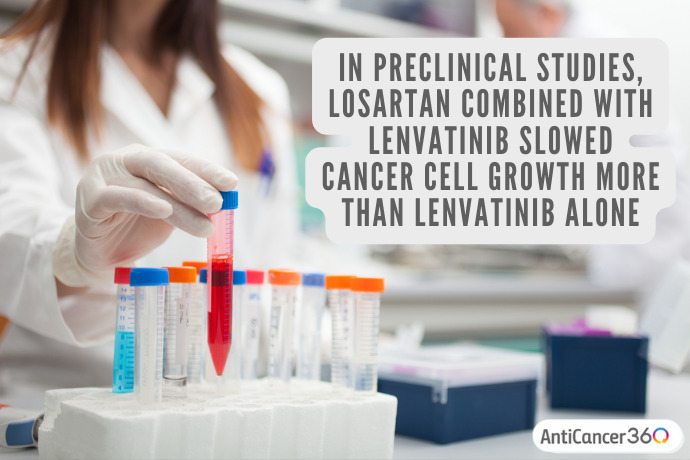
In addition, ovarian cancer cells were treated with losartan and a treatment known as CGP42112A in a 2014 investigation. The combined treatment was shown to kill more cancer cells than either option used alone [23].
Liver cancer
Lenvatinib is a medication used to treat hepatocellular carcinoma (a type of liver cancer). However, its aggressive side effects can make it intolerable for some patients [24]. A 2021 study investigated lower doses of lenvatinib in combination with losartan to see if this novel approach could help more people tolerate the medication. Losartan combined with lenvatinib resulted in halting cancer cell growth in lab studies more so than treatment with lenvatinib alone. This phenomenon was also seen when trialed in mice [25]. More studies are needed to determine if these effects are the same in people.
Pancreatic cancer
Losartan’s role in pancreatic cancer has been evaluated in people. In 2019, a trial with 49 patients tested losartan as a neoadjuvant treatment. Neoadjuvant means giving chemotherapy before surgery to shrink the tumor. The results were promising. Patients who received FOLFIRINOX chemotherapy, losartan, and radiotherapy had their advanced pancreatic cancer shrink and were able to have successful surgeries to remove the cancers [26].
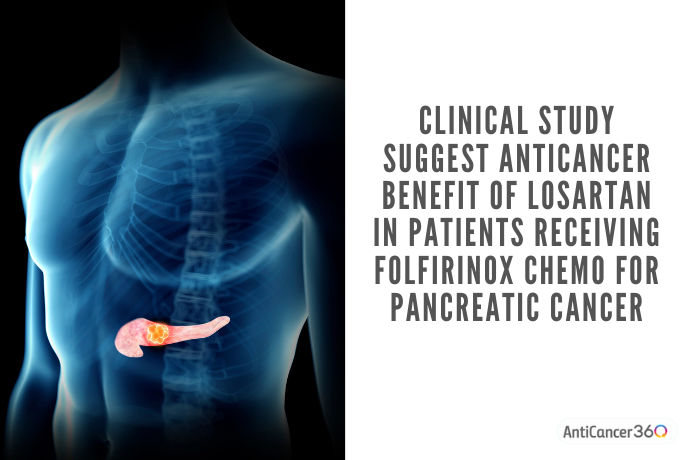
Also, a 2021 study assessed 114 patients with metastatic pancreatic cancer, dividing the participants into two groups. One group received chemotherapy alone while the other received chemotherapy plus losartan. Patients who took losartan with their chemotherapy treatment did not show any significant differences in overall survival, progression-free survival, objective response rate, or disease control rate compared to the control group. However, when analyzing the subgroup of patients who received FOLFIRINOX, there was a longer progression-free survival observed with losartan, although this result was not statistically significant due to the small sample size. To confirm if the benefits of losartan with FOLFIRINOX seen in locally advanced cancer also apply to metastatic cancer, further research in a larger group of patients is needed [27].
Nasopharyngeal cancer
Losartan has also been studied in patients with nasopharyngeal cancer. In a 2021 study, 927 patients with nasopharyngeal cancer received cancer treatment and had high blood pressure. In this study, 272 patients took an ARB medication (either valsartan or losartan). These patients had better survival rates at 5 years compared to those who did not take ARBs. Upon further research, losartan and valsartan were found to inhibit cell growth and blood vessel formation. This led to cell death. They achieved this by affecting the PI3K/AKT signaling pathway. This evidence suggests that ARBs could be beneficial for certain types of cancer [28].
Frequently Asked Questions About Losartan and Cancer
Can losartan cure cancer?
While there is no evidence that losartan is a cure-all for cancer, there is emerging evidence to support its use in people with cancer and high blood pressure. The data suggests that while losartan may not eliminate cancer on its own, it may increase the effectiveness of cancer treatments.
A study was conducted on mice to see how losartan affects colon carcinoma cells. It was found that losartan alone did not stop tumor growth. Another chemotherapy agent called doxorubicin did reduce tumor growth. But when doxorubicin and losartan were used together, tumor growth was inhibited to a much greater extent. This suggests that losartan can make doxorubicin more effective and have stronger anticancer effects [29].
What are the side effects of losartan?
Losartan is generally well tolerated. However, some side effects may occur [30]. Common side effects include:
- dizziness
- headaches
- nausea
- vomiting
- diarrhea
- pain in muscles or joints
More serious side effects can include:
- Liver toxicity displayed by yellowing of the eyes or skin
- Pancreatitis
- Low potassium, which may cause symptoms of weakness, muscle cramps, or irregular heart rhythm
- Allergic reactions
If you experience a severe side effect, seek medical help immediately. If any common side effects are bothersome, speak with your healthcare provider for advice.
What is the dosage of losartan? What is the dosage of losartan for cancer?
Losartan is available in three strengths: 25 milligrams (mg), 50 mg, and 100 mg tablets. For treating high blood pressure, the typical dose is 50 mg once daily [31].
Because losartan is not FDA-approved for cancer treatment, it is difficult to determine the exact dose that should be used for cancer. While experiments have been limited, existing studies used 25 mg to start and worked their way up to 50 mg [32], while other studies gave 100 mg of losartan daily [33].
Can losartan prevent cancer?
Recent evidence suggests that losartan may be beneficial for individuals with recessive dystrophic epidermolysis bullosa (RDEB), a genetic disorder that causes fragile skin and can lead to deformities and cancer. In a study with mouse models, losartan treatment was associated with preventing deformities. Clinical trials are being conducted to determine if the same effect occurs in humans [34],[35],[36].
Bottom Line
Ultimately, when using an Aggressive Integrative Approach to cancer, the goal is to fight cancer from every possible direction. This practice includes integrating repurposed medications and natural supplements to fight cancer in an evidence-based, safe way that shouldn’t interfere with your oncology treatment.
How are you approaching your cancer treatment? Are you integrating any natural supplements or strategic dietary approaches? Have you tried losartan or any other off-label approaches for cancer? Please feel free to share your experience or feedback in the comments below!
Are You A Good Candidate For Our Program?
If you’d like to learn more about the AntiCancer360 approach and see if we can help you, please watch our free online webinar to learn more. At the end, you’ll be able to schedule a free call with our team so that we can discuss your case in detail.
Medical Disclaimer: The information in this article is meant for educational purposes only. It is not intended to replace a healthcare provider’s medical advice, diagnosis, or treatment. Consult a healthcare practitioner before taking any new medications or supplements.
Dr. Patricia Weiser is one of AntiCancer360’s consultant pharmacists, science advisors, and medical writers. Her expertise helps us create safe herbal and supplement combinations and avoid potential drug interactions.
Patricia is a graduate of the University of Pittsburgh and a licensed pharmacist. She has clinical experience in both community and hospital pharmacy. She is passionate about integrative and preventative care and strives to empower her patients to take an active role in their health.

